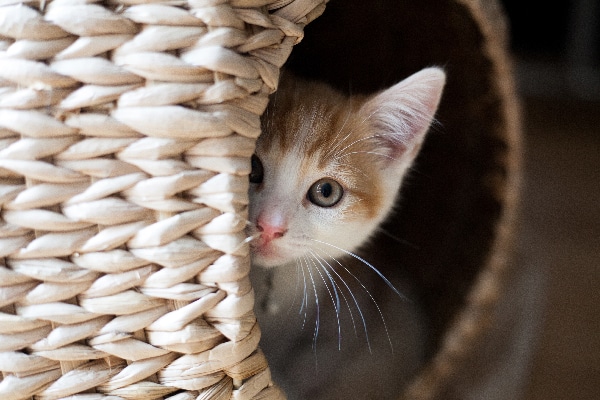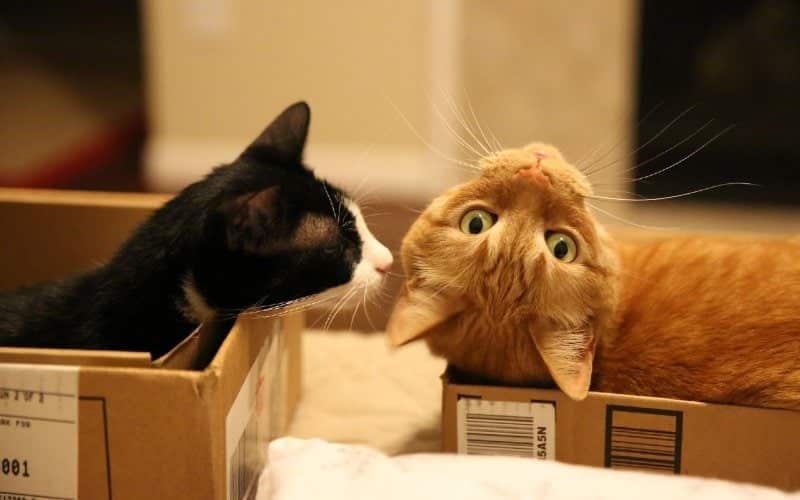Does your cat run and hide when they hear someone at the front door? Do they dash away under the bed when they hear the garbage truck coming? Are they pretty much scared of everything? If this sounds like your cat, you aren’t alone. Many felines can be on the skittish side, especially when it comes to loud noises, strange people, and new situations.
The good news is, though, that you can help your cat build up their confidence so they’ll be less scared of things! It’ll take a bit of work, but you can utilize your bond with your pet to get them to be more confident, less frightened, and less anxious about things new to them. Here’s a step-by-step guide on how to do just this!
Why Is My Kitty So Scared of Everything?
There are many reasons a cat could be scared of everything. If you adopted your pet from a shelter, it may be that your cat came from a home that was less than ideal (whether that means their previous owners were neglectful or there was simply lots of stress). Plus, cats coming from shelters tend to be a bit more anxious about their surroundings.

That isn’t the only reason a cat could lack confidence and fear everything, though. The most common reason is that the kitty may not have had proper socialization when they were young. If cats aren’t exposed to new people, pets, experiences, surroundings, and sounds when they are young, it makes it that much easier for them to be scared and overwhelmed when they experience these things. Newness is a break in a cat’s routine, which can be anxiety-inducing for many felines, resulting in an unconfident, scared cat.
It might also simply be genetics. Some breeds are just more prone to being less confident and more skittish about things happening around them. Or it could just be your pet’s personality. Just like some people are introverts while others are extroverts, cats can be the same. Your pet may just be shyer than most.
The 12 Steps to Make Your Cat More Confident
Ready to help your cat become a more confident version of themselves? Here’s a step-by-step guide to help you out! With these tips, you should be able to get your pet to be less skittish and a bit more outgoing.
1. Create routines
Routines are one of a feline’s favorite things. They help your cat feel safer and more secure because the predictability of a routine helps the kitty feel more in control. With a solid routine, your pet knows exactly what to expect and when to expect it. So, feed your cat at the same time every day, groom them on the same schedule, and so on.
2. Make a safe space for your cat
Cats like having a space all their own because it makes them feel safer and more comfortable. Creating a safe space for your kitty that guests aren’t allowed in gives them a spot to go when they want to escape with the knowledge they won’t be bothered. This can be a room, a cat condo, or even a box. Any spot that makes your pet feel safe. Keep this area calm and accessible to the cat so they can go there whenever they want.

3. Be consistent in your behavior with your cat
Also, be sure that everyone in the family is consistent; everyone should treat the kitty the same way.
4. Keep the kitty’s environment calm
Households can be chaotic, especially if several people are in the home, but for skittish cats, noise and chaos can be frightening. You can’t always keep your home nice and calm, but you can try to keep things generally that way so there aren’t always loud noises and chaos scaring your pet.
5. Make sure there are plenty of high spots for your cat
Felines love to climb to the highest place in the house, and there’s a reason for this. Sitting up so high means they can keep an eye on everything, which makes them feel more in control. So, have plenty of perches or cat towers available for your pet to get a bird’s eye view of what’s happening in the house.
6. Have plenty of resources
If you have multiple cats in the home, be sure you have enough resources for them all. Cats shouldn’t feel like they are always in competition for food, water, scratching posts, resting spots, toys, etc., as this can make them anxious and less confident. Ensuring all felines have their own individual resources keeps kitties happier!

7. Always allow your cat to make the first move
You may be eager to introduce the cat to your friends or a new animal, but your cat may not be as thrilled. Rather than trying to get them to stay in a room with new people or pets, let your cat observe from afar and approach when they are ready to interact.
8. Don’t ever force your pet to do something they don’t want to
Forcing your cat to interact with people or to play with another animal or anything else they aren’t interested in doing will only make them more fearful. Let your cat do things at their own pace. Building confidence is a slow process, but it will happen eventually!
9. Learn to read your pet’s body language
Cats can’t speak, but they can tell us a lot with their body language. If your pet is giving off tense or nervous vibes, back off and let them do their thing. Try approaching them again when they look more relaxed.
10. Allow your cat to be curious
Felines are naturally curious, so let yours be curious. A curious cat is one that is confident enough to explore their surroundings, and you don’t want to stifle that. Let your pet explore and roam where they want (provided there is nothing dangerous to them nearby!). Encouraging a cat to explore their surroundings is an incredibly simple way to boost their confidence.

11. Play with your cat often, particularly “prey” play
Prey play gives your kitty the opportunity to follow their natural inclinations to “hunt” down something, then catch and “kill” it. When they accomplish the capture and “kill”, it makes the cat feel happy (and having the ability to successfully hunt makes them more confident). Engage in other sorts of play as well, but play often!
12. Reward your pet
When your cat does something like approach a new animal in the home, all on their own, reward them with a treat. Or, if your cat is nervous around new people, you could give your guests a few treats to toss to your cat whenever your pet decides to come a bit closer to them. Positive reinforcement is a fantastic way to build confidence!
Final Thoughts
Building confidence in a scared or nervous cat will be a slow process, but with this guide, you should be able to get the task done. Cats can be scared and anxious for any number of reasons, but these steps should work for your pet, no matter the reason. Just remember to be patient and take things slow!
Featured Image Credit: Khamidulin Sergey, Shutterstock
Contents
- Why Is My Kitty So Scared of Everything?
- The 12 Steps to Make Your Cat More Confident
- 1. Create routines
- 2. Make a safe space for your cat
- 3. Be consistent in your behavior with your cat
- 4. Keep the kitty’s environment calm
- 5. Make sure there are plenty of high spots for your cat
- 6. Have plenty of resources
- 7. Always allow your cat to make the first move
- 8. Don’t ever force your pet to do something they don’t want to
- 9. Learn to read your pet’s body language
- 10. Allow your cat to be curious
- 11. Play with your cat often, particularly “prey” play
- 12. Reward your pet
- Final Thoughts











